Rheinmetall
 | |
| Joint stock company | |
| Traded as | FWB: RHM |
| Industry | Automotive, Defence |
| Founded | 13 April 1889 |
| Founder | Horder Bergwerks- und Huettenverein |
| Headquarters | Düsseldorf, Germany |
Key people |
Armin Papperger (CEO and chairman of the executive board) Klaus Greinert (Chairman of the supervisory board) |
| Products | Automotive parts, military vehicles and systems |
| Revenue | €5,183 million (2015)[1] |
| Profit | €160 million (2015)[1] |
| Total assets | €5,730 million (end 2015)[1] |
| Total equity | €1,562 million (end 2015)[1] |
Number of employees | 20,676 (end 2015)[1] |
| Website | www.rheinmetall.com |
Rheinmetall AG is an automotive parts supplier and military technology group headquartered in Düsseldorf. In fiscal 2015 (2014), the company's 20,676 (20,166) employees generated sales of €5.18 billion (€4.68 billion). Rheinmetall was the tenth-largest European defence contractor in 2011.[1]
The Group's Automotive unit had sales in fiscal 2015 of €2.59 billion, while sales of its Defence arm for the same period came to €2.59 billion.[1]
Rheinmetall AG is listed on the German MDAX; its shares are traded on all German stock exchanges.[1]
Company structure
Automotive
KSPG (previously known as Kolbenschmidt Pierburg) is the management company of Rheinmetall AG's automotive technology branch. A globally operating maker of automotive components, KSPG plays a leading role in air supply, pollution reduction and pump technology, as well as the development, manufacture and sale of pistons, engine blocks and smooth bearings, including the supply of spare parts. Development of new products takes place in close cooperation with major automakers. The company has been organized into three autonomously operating divisions since May 2012: Hardparts, Mechatronics, and Motor Service.[2]
The company's activities fall into seven business units, including Kolbenschmidt (which manufactures pistons); Large Pistons; Pierburg (components for air supply and pollution reduction); Pierburg Pump Technology (coolant, oil, recirculation and vacuum pumps); Plain Bearings (metal bearings and bearing elements as well as continuous casting elements); Aluminium Technology (engine blocks); and Motor Service (repair and maintenance sales for KSPG).[3]
Defence
Rheinmetall AG's Defence arm is one of the world's leading producers of systems and equipment for ground, air and naval forces.[2] Rheinmetall Defence has three divisions: Weapon and Munition, Electronic Solutions and Vehicle Systems. Its subsidiaries and affiliates are embedded in these three divisions.[4]
Though based in Germany, Rheinmetall Defence now has production plants and representative offices in eighteen countries.[4] , serving the armed forces, security services and law enforcement agencies of numerous nations:
- US
- Canada
- Great Britain
- Norway
- Sweden
- The Netherlands
- Germany
- Switzerland
- Austria
- Italy
- Russia
- Saudi Arabia
- United Arab Emirates
- South Africa
- Singapore
- Malaysia
- Australia
- Indonesia
- Turkey
History
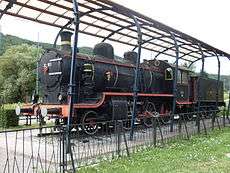
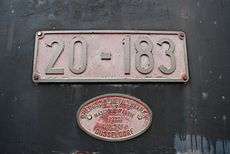
Rheinische Metallwaaren- und Maschinenfabrik AG was founded in 1889 in Düsseldorf by Heinrich Ehrhardt and his associates to take on a contract that Hörder Bergwerks- und Hüttenvereins (a munitions company) could not fulfil. At the start of the twentieth century Dreysesche Gewehrfabrik, Munitions- und Waffenfabrik was added to Rheinmetall.
After World War I, as a result of the treaty limitations imposed upon Germany, Rheinmetall produced non-military items.
In 1935, the Reich took majority shareholding. The railway locomotive manufacturer August Borsig GmbH was taken over in 1933. This led to the merger in 1936 giving Rheinmetall-Borsig AG.
The Reichswehr placed a contract with Rheinmetall for a tank design leading to the Neubaufahrzeug (a cover name meaning "new construction vehicle"—as tank production was still banned).
The company went on to produce guns for tanks used by the Wehrmacht (such as those used on the Tiger I and Panther tanks) and anti-tank guns.
Production facilities were damaged by Allied bombing during World War II leading to relocation in eastern Germany and Poland. In the immediate post-war military production was banned and it was not until 1956 that arms production started again. The company name changed to Rheinmetall Berlin AG.
Controversies
Rheinmetall was implicated in a corruption case in India alongwith arms dealer Abhishek Verma and his wife Anca Verma lodged by the anti-corruption agency of India the CBI in 2012 for bribing defence officials to secure multi-billion weapons contracts of the Indian military. At present the case is on trial in Indian courts.[5][6][7][8]
- Acquisitions
- Chempro GmbH (2007), 51% share[9]
- ADS Gesellschaft für aktive Schutzsysteme mbH (2007) (76%)[9]
- Zaugg Elektronik AG (2007)[9]
- Stork PWV (2008)[10]
- Rheinmetall Denel Munition (Pty) Ltd. (2008)[10]
- LDT Laser Display Technology GmbH (2008)[10]
- Rheinmetall MAN Military Vehicles GmbH (2010), a joint venture with MAN Truck & Bus, under Rheinmetall management (51%)[11]
- Verseidag Ballistic Protection GmbH (2010)[11]
- Laingsdale Engineering (Pty) Ltd. (2010)[11]
- Simrad Optronics ASA (2010)[11]
- Swiss Simtec (2011)[12]
- Vingtech Corp. (2011)[12]
Military products
Modern
- RMMV Survivor R medium weight protected wheeled (4×4) vehicle.
- Rheinmetall 120 mm Gun: both the L44 and L55 versions which arm the Leopard 2, M1A1 and A2 and Type 90 MBT
- Rheinmetall M35: 105 mm main gun of the M8 Armored Gun System
- 155 mm L52 Artillery Gun: main gun of PzH 2000 self-propelled howitzer
- MG3: 7.62 mm universal machine gun
- RMK30: a 30 mm recoilless, caseless autocannon
- Rheinmetall LTA2: main gun of TAM tank
- MK 20 Rh202: 20 mm autocannon, primary armament of Marder, Luchs and Wiesel armoured fighting vehicles
- Rheinmetall 20mm Twin Anti-Aircraft Cannon: anti-aircraft gun
- GDM-008 Millennium: 35 mm naval air-defence gun
- Skyguard: 35 mm air-defence gun system
- Skyshield: 35 mm air-defence gun system
- MANTIS (counter rocket, artillery and mortar): very short range air-defence system
- MLG 27: 27 mm remote controlled autocannon, used on many ships of the German Navy
- AGF (Light infantry vehicle)
- TPz Fuchs: multirole armoured vehicle
- YAK: armoured wheeled vehicle
- Wiesel AWC: armoured weapons carrier in different versions
- GTK Boxer: multirole wheeled armoured vehicle
- Puma (IFV): next generation infantry fighting vehicle of the German Army
- Lynx: multirole tracked armoured vehicle
- LeFlaSys: light air-defence missile system, based on Wiesel 2
- Jacket cradle of Oto Melara
- KZO: tactical UAV
- IdZ-ES: The German Bundeswehr's Future Soldier program
- Nanuk Remotely Controlled Weapon Station (Rheinmetall Defence Canada)
- Amarok Remotely Controlled Weapon Station (Rheinmetall Defence Canada)
- Qimek Remotely Controlled Weapon Station (Rheinmetall Defence Canada)
- NBC protection systems
- Ammunition
- Cargo loading and aviation systems
- Simulators
- NBC reconnaissance systems
- Mobile Power Distribution Systems (MPDS)
WWII and pre-WWII products
- QF 15 pounder: field gun sold to Britain in 1900
- 7.5 cm Model 1901: field gun sold to Norway in 1900
- MG 30: machine gun, design licensed to Switzerland and Austria
- 7.5 cm Kwk 42 (L/70): tank gun that was used in the famed Nazi German Panther tank of World War II
- 7.5 cm Leichtgeschütz 40: recoilless gun predominantly used by Nazi paratroops during World War II
- 8.8 cm Flak 18/36/37/41: German Flak and anti-tank gun of World War II
- Solothurn S-18/1000: 20 mm Anti-Tank rifle used by Switzerland Nazi Germany, Kingdom of Italy and Kingdom of Hungary in World War II
- Rheinmetall MK 108: well-known WWII 30 mm gun used on Luftwaffe aircraft mainly in the interceptor role
- Rheinmetall also designed and built the Karl-Gerät self-propelled siege mortar used by Nazi Germany during World War II
- M19 Maschinengranatwerfer: Automatic 5 cm mortar
- 3.7 cm SK C/30: Anti-aircraft gun
Gallery

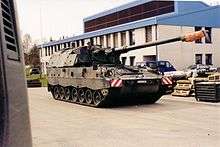 PzH 2000 of the German Army
PzH 2000 of the German Army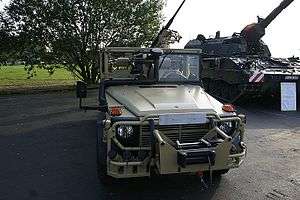
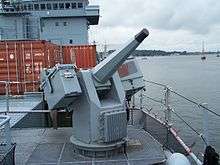
 Wiesel 2 in the Ozelot anti-air version of LeFlaSys
Wiesel 2 in the Ozelot anti-air version of LeFlaSys
References
- 1 2 3 4 5 6 7 8 "Annual Report 2015" (PDF). Rheinmetall. Retrieved 17 March 2016.
- 1 2 "company's corporate website".
- ↑ "company website KSPG".
- 1 2 "company website Rheinmetall Defence".
- ↑ "CBI charges Abhishek Verma, Rheinmetall official with bribery". Retrieved 2016-08-07.
- ↑ "Abhishek Verma was promised $5m by Rheinmetall Air Defence to remove its name from govt's blacklist - Times of India". Retrieved 2016-08-07.
- ↑ "Swiss authorities refuse to share information on Abhishek Verma - The Economic Times". Retrieved 2016-08-07.
- ↑ "CBI to push for red corner notice against top Rheinmetall executive". 2014-06-06. Retrieved 2016-08-07.
- 1 2 3 "Annual Report 2007" (PDF).
- 1 2 3 "Annual Report 2008" (PDF).
- 1 2 3 4 "Annual Report 2010" (PDF).
- 1 2 "Annual Report 2011" (PDF).
External links
| Wikimedia Commons has media related to Rheinmetall. |